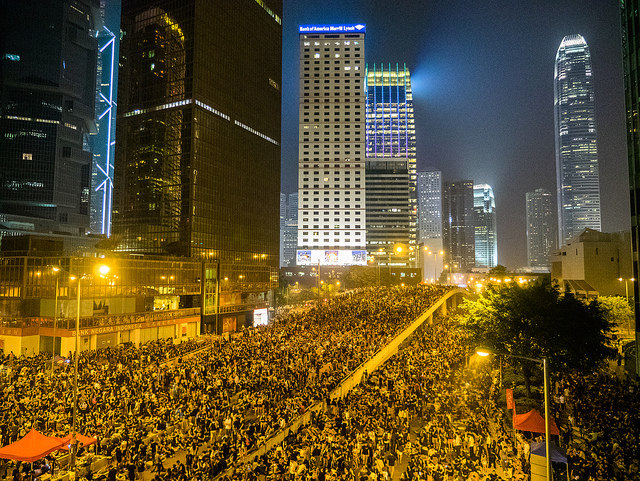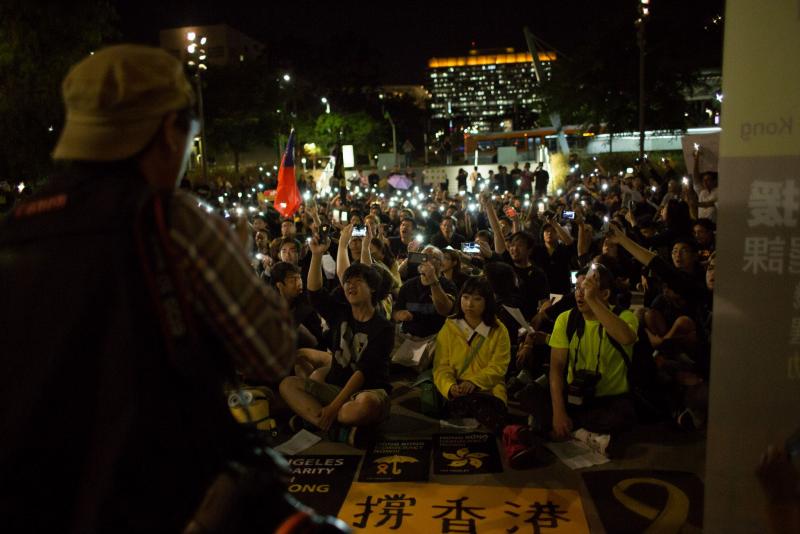Dissent In Hong Kong: A Perspective From Overseas

First of all, to those of you who have no idea what is going on, here is a quick description: since Hong Kong's return to Chinese rule (we were a British colony before then), citizens and lawmakers in Hong Kong have been pressing for true universal suffrage for our leader, the Chief Executive. The Chinese central government, who currently has the largest influence in picking our leaders, had promised to grant Hong Kong a democratic election for the Chief Executive in 2017. The catch is that all of the candidates will be nominated by a committe of 1200 people, most, if not all, of whom are pro-Beijing. This means that we can only vote for candidates that are pre-selected by the Chinese government. It is a terrible facade for democracy in Hong Kong and we're not a bit happy about it.
READ MORE: Hong Kong Protest Stories on Social Media
Trying to understand what protesters are actually going through is not the easiest thing for an overseas student to do. I've been reading a lot of my Facebook newsfeed, where so many of my friends are posting about how the police are condemnable traitors and the protesters are brave and strong freedom fighters. There are countless pictures showing how peaceful and disciplined protests have been dealt with unreasonable violence from the police. I've also read articles on the exceptionally disciplined behavior of Hong Kong protesters - no destruction of public space, no vandalism, no weapons; we make single-file lines to pass down supplies; we immediately make way for ambulances when they need to get through even while the whole road is filled with demonstrators, just like how Moses split the Red Sea.
Other voices are calling us to look at the issue from the police's point of view. The idea that the police are betraying Hong Kong is toxic and it spreads like such a major epidemic on Facebook, that sometimes we fail to analyze the situation critically. Sure, some police officers are more radical than others, which could very well be all it takes for conflicts to escalate. However, we should understand that the police are responsible for maintaining the well-being of the city and keeping it safe and clean, which they have consistently done a good job at. At the same time, they are following orders from the government to quell the protest, so what could we expect? They are simply carrying out their duties. Yet people have been calling members of the police force "shameful." A friend of mine who has always aspired to join the police force immediately abandoned the thought after the protest started.
This is just one example of how problematic arguments like these bother me. Not being able to participate in the protest, interact with protesters face to face or simply observe the protest in person make it difficult to take a side. In other words, I find myself feeling strangely ambivalent about certain issues that the protest brings up. As I ponder upon my place in this historical moment in my hometown, I can't help but reconsider my identity as a overseas student from Hong Kong.
READ MORE: Students Stage Mass Protest in Hong Kong for Democracy
Since I started studying in the United States four years ago, I have admittedly developed a sense of detachment from the current issues in Hong Kong. I go back fairly often and I talk to my family and friends about current events that happen in Hong Kong, but I learn about these events from an outsider's perspective, as if I were a foreigner. I read the New York Times or The L.A. Times instead of local media outlets about an issue in Hong Kong.
When the Occupy Central movement, the organization that helped fuel the protest, started the year-long societal discourse on occupying Central, the financial heart of Hong Kong, I couldn't care less. Protests are not a rarity in Hong Kong; we have an annual one on July 1, the day of Hong Kong's handover from British to Chinese sovereignty. These protests have also addressed some of the issues that the current one does, such as the demand for universal suffrage. Still, I never expected, nor do I now expect, us to reach any realistic outcome since we're going against the unmovable wall of Chinese conservative rule. The chairman of the People's Republic of China, Xi Jinping, has a reputation for not yielding concessions easily. Since our Chief Executive of Hong Kong, CY Leung, is only a puppet planted by Beijing, I don't expect him to step down either, which would only be a sign of weakness on Beijing's part. Considering these facts, I never took the movement seriously. Not until last Friday.
In fact, I didn't even start caring about the protest until my girlfriend, who is in Hong Kong right now, told me that she wanted to join it. I had to find out if this was something I would support her to do. Some of my closest friends are actually taking part in the protest as well. They all told me and other people how dangerous and serious the situation has become. Even some of my students (ages 14-15), whom I taught this past summer from a summer school in Hong Kong, wanted to join.
The scale of the protest has grown so rapidly, with more than 100,000 protesters in four different major districts in Hong Kong at one point, that I felt like indifference was a crime - I had to care. I started reading news article after news article, blog posts, Facebook newsfeeds...everything I could to get an accurate picture of what it's like to be in Hong Kong right now. It is a historical moment in my home and I hate that I cannot take part in it.

READ MORE: What's Next For The Protests In Hong Kong?
In regards to the protest we had here in L.A, I'm not sure what effect we're having, but I felt genuinely proud to call myself a Hongkonger for the first time.
If there is a lesson to be learned, it's not about politics or freedom or protest, it is about identity. And it's not just bragging about how civilized and awesome we are as protesters and a society to my friends in America (although admittedly, I enjoy doing that), it is about finding that place deeply hidden inside my heart that is forever and unconditionally connected to my home, and reawakening it in order for me to know who I am and what my place is in the world.
For so long, I have developed this idea in my head that in America, I don't have to be so conscious of where I'm from, because I would just be a foreign person to people. All I ever wanted was to assimilate into American culture and just be another American. But sometimes, it's worth reminding others, and myself, of where I'm from and what that means to me, because I can lose sight of my unique personal identity if I don't.
To those of you who want to help raise awareness for the fight for democracy in Hong Kong, do all that you can do to learn, read articles about it, share your thoughts on social media and talk about the issue with your friends. Democracy is not just an issue in Hong Kong. To those of you who are connected to Hong Kong in any way, show support to your friends and family in Hong Kong and let them know that there are people in L.A. that care a lot. To those of you who still hate the police, try to understand that they are not your real enemy, for they are also Hongkongers; they also have family and loved ones in Hong Kong and want a good future for us. They are simply carrying out orders from officials. Our real enemy is our current ruling and voting systems.
To those of you who are still on the streets in Hong Kong, fight on.
Contact Staff Reporter Matthew Leung here.



